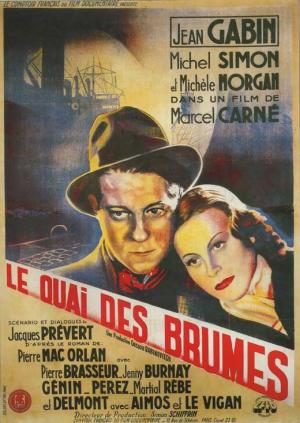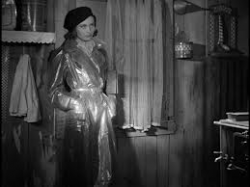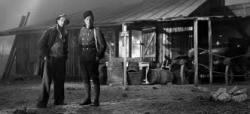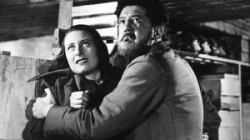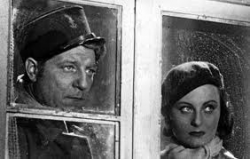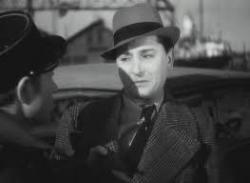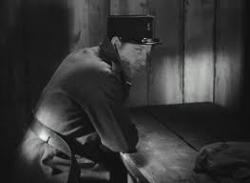Poetic fatalism
By Michael Roberts
Quai Des Brumes (Port of Shadows) is masterpiece, a miracle of story, tone and execution from Marcel Carné and one of the greatest classic French films that (along with the contemporaneous Duvivier's Pepe Le Moko and Renoir's La Bete Humaine) also delivers another note perfect Jean Gabin performance. Aided by a powerful script by Jacques Prévert, the piece embodies a genre now classified as Poetic Realism, but I would personally prefer poetic fatalism as a description of this style of film, as it is fatalism that hangs like the fog that we see in the opening shot. A weary and haunted Jean Gabin is on the way to somewhere, anywhere, and we’re along for the ride. The mood is sombre, the situations understated, but inescapably compelling. All the characters seem destined to reach for something better than their world is prepared to yield, so frustration and melancholy dominate. Gabin's world is momentarily brightened by a young woman that time and circumstance has not yet completely ground down, and in ways that would be unthinkable in the Hollywood of the time. Sexual frankness…. mon dieu!
Carné establishes the mood with a lonely road and Gabin’s soldier Jean, a solitary figure emerging from the fog, and we soon learn he’s a deserter heading for the port of Le Havre. He’s not much for words but immediately it's established that he’s escaping from a ‘fog of the mind’ as much as anything, mental scars from watching young men die by his soldier’s gun. Jean has an ability to attract strays, first a dog and then later a lost girl, the luminous Nelly (Michele Morgan) and we come to realise it’s his innate integrity to which they are attracted. This is countered by the villains of the piece. We meet the slimy Zabel (Michel Simon) a shopkeeper with delusions of upper class respectability, repelled by the small time gangsters like Lucien (Pierre Brasseur) with which he has to do business.
As Jean looks for a way out, he encounters the lost souls at Panama’s, a run down tavern by the river who take him in. There he encounters the painter who encapsulates the overarching philosophy inherent in poetic fatalism when he states ‘a swimmer is already a drowning man’. Meeting Nelly there Jean gives her his cynical take on love, but faced with the gorgeous vision in a beret and raincoat he realises she’s in need of escape as much as he is. The painter also hints about what’s ‘hidden’ behind the surface’ and in a way that’s the concern of the film. Carné and Prévert are concerned with facade versus reality and the tension in the distance between them. On the surface Jean is a deserter, running away from responsibilities, but underneath a genuine dignity resides. Zabel is a respectable businessman, with a love for religious music and the finer, higher things but that hides a murderous and jealous heart that lusts for his god-daughter Nelly, for whom he is also the legal guardian.
The subplot about a young thug trying to mark his turf and establish his machismo, also intrudes on Jean’s solitude and plans. The insecure and slightly psychotic Lucien is put in his place by Jean and broods until he can wreak his inevitable revenge. There’s a beautiful grace note regarding a suicide, it’s touching and portentous at the same time, a glimpse of a half longed for fate maybe. Jean merely shrugs off the vagaries of this world, and walks his own fatalistic path regardless. These characters are alone and not alone, an eternal dilemma that in this world holds no trite answers, if any at all. The best they can hope for is the occasional ray of light to penetrate the fog of loneliness. Nelly and Jean find a night of happiness and instinctively know such beauty is fleeting, hoping against hope that they can plot a future together in some mythical place. The divide between men and women temporarily bridged. Carné and Prévert weave an existentialist subtext into the script, hinting that meaning is to be found in little dreams, like the drunk who dreams of sleeping between two white sheets.
In 1938 France was detecting with the winds of war, blowing again from the German border, a threat made doubly sombre by the self-destruction of the leftist Fronte Populaire, France's attempt to counter the rise of Fascism in Europe. Carné and Prévert concocted a tale of escape, of ordinary people running from impending disaster and putting their faith in in an unknown future that had to be better than the shaky present. The look of Port of Shadows is timeless and the performances hold up beautifully to modern sensibilities. Without this type of film as a key influence it’s hard to imagine Hollywood getting the Rick part in Casablanca so right. Gabin was known as the French Bogart to some, but he did get there first.
Quai Des Brumes (Port of Shadows) was a high point for the genre they had no idea they had helped create and would subsequently come to define, and it duly won France’s highest film prize in 1939, the Prix Louis-Delluc. Prévert adapted the novel by Pierre Mac Orlan to create one of the greatest romance films of all time and one of the great existentialist films as well, with a fine pitch of fatalism thrown in. The film was not a huge hit at the time of release as the romanticising of a deserter created something of a scandal, but it solidified Jean Gabin’s position as France’s pre-eminent screen star and it also made an overnight star out of the wonderful Michèle Morgan. Whilst Carné will never be accused of being a political filmmaker, Quai Des Brumes is a product of the times inasmuch as it is born out of the failure of the Front Populaire, the left-wing coalition that was elected to power in 1936 but disintegrated in a few short years. The earlier Carné/Prévert collaboration, Drôle de drame, like Renoir’s Crime De M. Lange, came out of the collective optimism of the political left (Prévert was a communist and member of Groupe Octobre) but the personal gloom of the collapse of Léon Blum’s government in the wake of the Spanish Civil War and the rise of the Fascists in Europe is captured in the mood of Quai Des Brumes. Carné and his gifted playwright scenarist, Jacques Prévert would collaborate many times during this period, but none were better or more perfectly realised than this tale of a lost soldier in a lost port.
